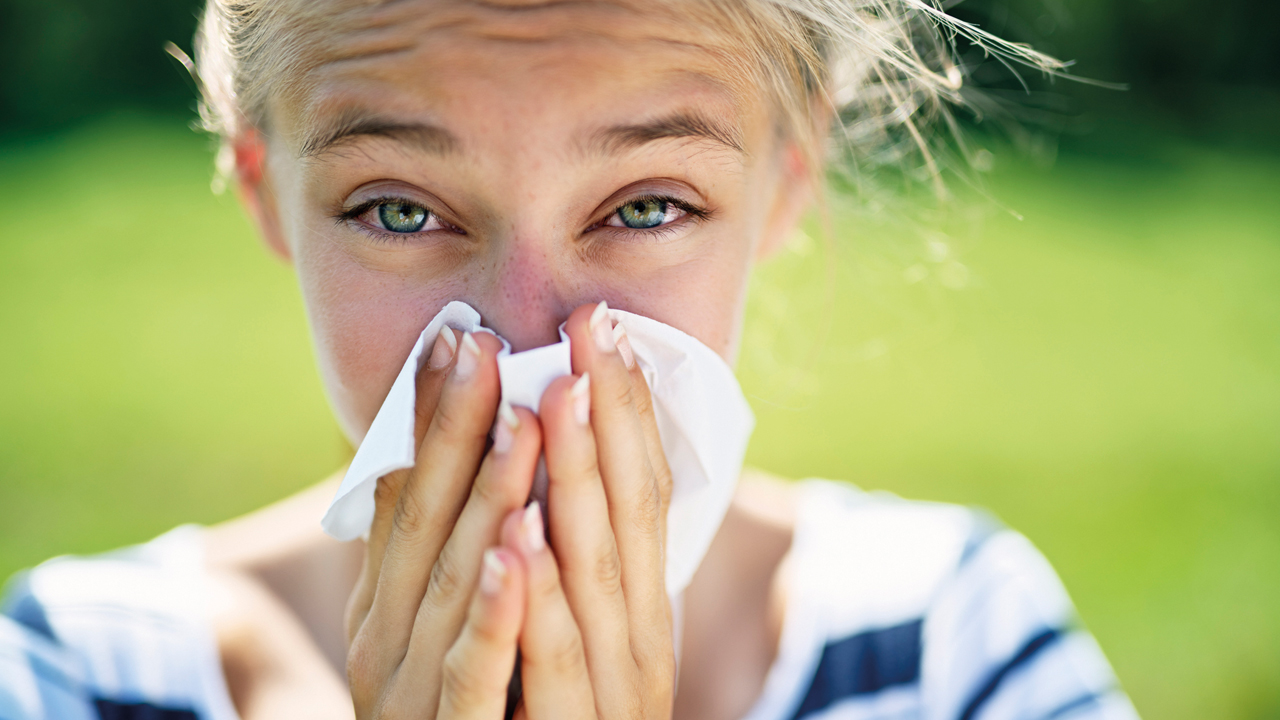In Clinical
Follow this topic
Bookmark
Record learning outcomes
Hypothesis generation
Nasal congestion is a common and predominant symptom of various forms of rhinitis, especially those associated with upper respiratory tract infections (infective rhinitis) and allergies. Given her associated symptoms of cough, palate itching and watering eyes, Debbie’s self-diagnosis of hay fever seems plausible. However, other forms of rhinitis that are not allergic need to be considered.
Likely diagnosis
- Intermittent allergic rhinitis (hay fever)
- Infective rhinitis
- Persistent allergic rhinitis.
Possible diagnosis
- Non-allergic rhinitis: endocrine in origin; caused by medicines (unlikely in this case)
- Structural: adenoidal hypertrophy (seen in children, so unlikely); deviated nasal septum; foreign body (seen in children, so unlikely); nasal polyps.
Critical diagnosis
- Tumour.
Continued information gathering
Debbie has symptoms that could be attributed to any one of the three likely causes being considered, and questions need to focus on the presence of other symptoms, trigger factors, and exploring further personal and family histories of atopy.
On questioning, she tells you her main symptom is the blocked nose. She hasn’t really experienced any excessive sneezing and her cough is only occasional and seems to be due to her itchy throat. Both eyes seem watery, and she reports mild redness and irritation.
She says she has had asthma since she was a teenager, but rarely gets symptoms. She reports no skin problems. She does tell you that her dad used to have quite bad hay fever, but over the last few years, it hasn’t bothered him as much.
Overall, the timing (April) and Debbie’s symptoms seem to suggest hay fever. Her personal and family history of atopy further supports this diagnosis. Infective rhinitis seems unlikely, given that she has few symptoms of an upper respiratory tract infection.
Problem refinement
To further rule out persistent allergic rhinitis, you could see if Debbie has been in contact with animals or has any new pets. She says this is not the case.
Debbie’s self-diagnosis of hay fever seems correct. Before recommending treatment, however, it is worth mentally checking that none of the other potential causes are responsible for her symptoms.
As her symptoms are bilateral, unilateral problems (e.g. deviated nasal septum or tumours) can be discounted. Polyps, while common and generally bilateral, would be associated with longer- standing symptoms and, frequently, loss of smell and/or nosebleeds.
The only condition yet to be considered is non-allergic rhinitis. This can present similarly to hay fever but is commonly associated with worsening symptoms after exposure to changes in temperature or humidity. Debbie does not report such symptoms.
Red flags
Her age and bilateral symptoms imply that a tumour is very unlikely.
Self-care options
Instigating measures to reduce pollen exposure will help to minimise symptoms. Debbie should be told to limit being outdoors when pollen counts are high and to keep windows closed. To reduce eye irritation, she could wear wrap-around sunglasses.
Treatment options
It appears that Debbie’s symptoms are mild, intermittent and general, therefore an oral antihistamine could be recommended. On that basis, loratadine or fexofenadine could be recommended due to their propensity to cause the least sedation.
Before selecting one of these medicines, it would be worth checking the likelihood of pregnancy, as loratadine has the greatest data on safe use here. Debbie says she is not pregnant. You decide to recommend fexofenadine (one tablet daily). You inform her that her symptoms should respond quickly after taking the first dose, but for maximum effect it needs to be taken regularly.
Safety netting
You tell Debbie that you agree with her self-diagnosis of hay fever and think an antihistamine will resolve all of her symptoms. You say her symptoms should start to improve after the first dose or two, but you warn her that not everyone sees benefit from the first antihistamine they try.
If her symptoms do not improve over five to seven days, it would be worth coming back to the pharmacy to discuss alternative options.
Now check your knowledge of nasal congestion by answering the following questions:
1. Which ONE of the following conditions most closely mimics allergic rhinitis but is triggered by irritants such as smoke or strong odours rather than allergens?
a. Deviated nasal septum
b. Infective rhinitis
c. Nasal polyps
d. Non-allergic rhinitis
e. Sinusitis
2. A patient presents with persistent nasal obstruction and loss of smell. Which ONE of the following conditions should be considered the most likely differential diagnosis?
a. Acute sinusitis
b. Angiofibroma
c. Foreign body
d. Nasal polyps
e. Persistent allergic rhinitis
3. Which ONE of the following conditions is a structural cause of nasal obstruction that can present similarly to allergic rhinitis?
a. Adenoidal hypertrophy
b. Angiofibroma
c. Deviated nasal septum
d. Foreign body
e. Nasal polyps
4. A 29-year-old female patient asks to buy fexofenadine to treat her hay fever. You find out that she is taking an antibiotic for sinusitis, but she cannot remember the name of it. Which ONE of the following antibiotics should be avoided when taking fexofenadine?
a. Amoxicillin
b. Cefalexin
c. Doxycycline
d. Erythromycin
e. Flucloxacillin
5. A young mum wants to buy an antihistamine for her hay fever. You find out that she is breast feeding. Which ONE of the following antihistamines could be recommended?
a. Acrivastine
b. Cetirizine
c. Chlorphenamine
d. Loratadine
e. Promethazine
Answers: 1. d 2. d 3. c 4. d 5. b

